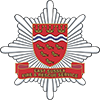Clear and compliant signage is vital for fire safety in all buildings. It helps occupants evacuate safely and assists emergency services, especially during low visibility situations.
Fire Safety Signage
Every building must display the correct fire safety signage in clearly visible and maintained positions.
Key Sign Types
Fire Action Notices will show what to do in a fire and will be tailored to your evacuation strategy. These are required in communal and staff areas.
Escape Route & Exit Signs mark exits and directional routes. Use photoluminescent or LED-lit signs compliant with BS 5499 & EN ISO 7010.
Other signs include fire extinguisher ID, alarm call points, and fire door notices.
Workplace signage is required under the Health and Safety (Safety Signs and Signals) Regulations 1996 (HSE)
Wayfinding Signage
The legal requirement is for all multi-occupied residential buildings >18m and all new residential buildings >11m to have wayfinding signage
Features
- Clearly marked floor levels and flat/unit numbers
- Visible in smoke and low light
- Durable, fire-resistant materials
Wayfinding Signage – Regulation8 (gov.uk)
Where It Applies
- Residential: signage in communal areas
- Workplaces: full signage suite required
- Hospitals & Care Homes: use pictorial and multilingual signage
- Shops & Public Buildings: use clear signage for public evacuation
Regulations
- Fire Safety (England) Regulations 2022
- Approved Document B
- BS 5499 / EN ISO 7010
- Health and Safety (Safety Signs and Signals) Regulations 1996
- Building Safety Act 2022
Signage is a legal and life-saving tool.
Make sure all required fire safety and wayfinding signs are visible, compliant, and maintained regularly as part of your fire safety strategy.
